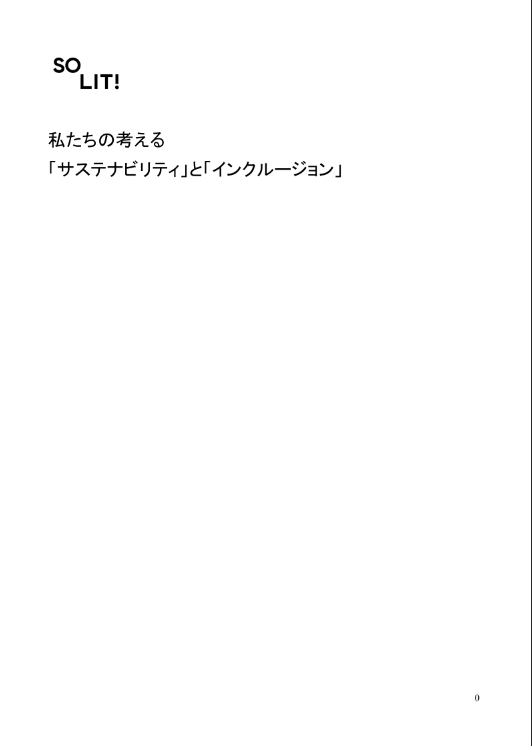Sustainability and Inclusion
Our ambition is to realize an “all-inclusive” society in which no one is left behind, whether it is diverse people, animals, plants, or the environment. We aim to create a society that accepts differences as they are and allows them to coexist in a healthy manner.
At PROJECT SOLIT, we value the keyword “ plurality”, and we are committed to all people, things, and actions. We believe that the true value of society lies in recognizing the complexity of each individual and respecting each other's existence, based on the premise that all things, even those that tend to be categorized, are not one-dimensional, but contain complex elements and always influence each other.
Sustainability & Inclusion Report
-

This report summarises SOLIT's initiatives and achievements in adopting sustainable and inclusive production methods.It outlines the main initiatives, current progress and future targets.
Build an equal partnership
Under the current mass production system, factories usually cannot consider the required product sewing levels and contract prices. This is because sewing prices are calculated after client companies decide on components and sales prices.
However, we, SOLIT, decide how to make products together with manufacturers. We want to create spaces to think together as a team with manufacturers, not only to request what is already decided. As a result, we could reduce the tailor's unnecessary labour and improve design and unprecedented options.
Also, it costs a lot of labour to produce comfortable clothes for diverse people. We build equal partnerships with respect for manufacturers by making spaces to think together as a team and paying appropriately.
Keep employment of the technicians and lead to educate the next generations
It is an urgent issue that current sewing factories need more environments to educate the next generations and pass on the skills.
Mass production mainly adopts the assembly line system, which keeps sewing the same part of clothes because it prioritises efficiency. This results in less use of the sewing method that one person sews the whole pieces of a cloth. If the tailors learn only one part of the sewing process, they cannot sew the entire clothes or step up their skills and careers. Another concern is the skill of stitching the whole parts of clothes would disappear.
Our customisable clothes make more opportunities for one person to sew the whole part of clothes because we chose this sewing method. We can keep hiring skilful workers and lead to educating the next generation if we stably provide the job using the whole-sewing skill.
For we are the ones who embody the most
At PROJECT SOLIT, we are constantly discussing with our members and doing the best we can at this point in time to achieve “all-inclusive” from multiple perspectives such as “organizational structure,” “employees,” “community,” “environment,” and “customers”.
We have done everything we can in our own brand to share our know-how and insights with those who are wondering what kind of inclusion is possible within their organizations and businesses.
SOLIT Organizational Structure
SOLIT is a community of various likes-minded people who share the same vision; SOLIT members themselves are a team of diverse decision makers from different nationalities, languages, sexualities, living environments, housing, ages, professions and occupations, who coexist and collaborate with each other. We also collaborate with hospitals and research institutes to conduct interviews and questionnaires with the people involved.
Final Decision Criteria
Decisions are made not for immediate short-term gain, but based on whether the project is inclusive of diverse people, does not burden the global environment (the more we build, the better off we will be), and takes human rights into consideration.
















